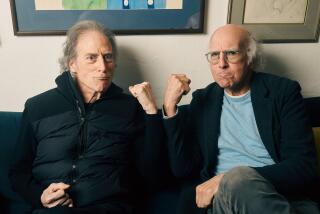A Favorite Uncle Who Found His Medium
- Share via
His timing was historically perfect. It was as if Milton Berle, who died Wednesday after a brief illness at the age of 93, had spent his life from early childhood perfecting the comedic skills that would let him beguile television’s huge yet intimate audiences.
For its part, television needed a charismatic personality to symbolize its new dominance as the great mass medium of entertainment. The man and the medium found each other, to the delight of the many millions of us who surrendered our Tuesday nights to Berle.
Someone, a publicist probably, once called Berle “The Thief of Badgags.” But the truth was that Berle was larger than the sum of all the jokes he retained in his card file-like memory. Like Lucille Ball, his nearest counterpart among his contemporaries, Milton Berle was pure clown, a personality whose highest gifts, like Ball’s, television inspired and revealed.
Berle had seen it coming. He said he remembered doing experimental television transmissions in New York in, he thought, the late ‘20s, wearing green makeup, which the primitive TV cameras saw best. Yet even Berle at his most optimistic could not have guessed the day when he could fairly be called Mr. Television.
The most vivid memories some of us retain from his “Texaco Star Theater” days were of Uncle Miltie in drag as the least likely female impersonator of all time. He was a master of the delightfully preposterous, the willing and calculated self-mockery.
William Thomas, retired editor of The Times and a longtime friend of Berle’s, said Wednesday, “At lunch, Milton would talk about the structure of comedy. He thought about it. He lectured about it at universities.”
He had learned it the hard way. He had faced small and sometimes hostile or indifferent audiences (one as bad as the other) in vaudeville, and had learned to convert drunken heckling to laughter in nightclubs. There was a lot of fun along the way, as he recalled in his autobiography. Yet I find myself remembering the famous anecdote about the English comic actor Edmund Gwenn.
A friend, visiting Gwenn as he lay dying painfully in hospital, said, “Eddie, it must be tough.” Gwenn is said to have replied, “Yes, but comedy is tougher.”
Although in his early days Berle was a master of the joke, jokes in rapid-fire succession on almost any subject anybody could name, he reached television not as a teller of jokes, but as a personality, a characterization all his own, as Jack Benny’s and Bob Hope’s were all their own. He moved through skits with a dancer’s physical assurance, and he played a man whose dignity and confidence were always in peril, as if there were banana peels lurking at every step. Like Ball, he did not mind making himself a figure of fun because that, after all, was the name of the game, and he played it supremely well.
During his days as a kid in vaudeville, magicians on the bill would show him card tricks, and in later life Berle could have probably made a sub-career out of hand magic. One day at lunch, he demonstrated a trick that involved one of my fellow editors picking a card, concealing it back in the pack and then telling Berle what the card had been. Berle then invited my colleague to find the card in the pack again. My friend went through the pack, card by card, while the rest of us grinned. The card was stuck to Berle’s forehead.
He was a funny magician too.
It is always easy to say that the end of an era has been reached. Yet there is only Bob Hope, seriously ailing and reclusive, of Berle’s close contemporaries. The gang that used to lunch together at the Friars Club, Jack Benny and George Burns and the other great comics are gone too. Of his younger contemporaries, Red Buttons is one of the few who came up the same hard-learning road via burlesque, the Catskill hotels (themselves now an endangered and fading species) and nightclubs.
New generations of comedians have come along, nurtured at coffee houses and college appearances. The cleverest of them are very entertaining, but it is not clear who among them could keep us at home on Tuesday nights, year after year. Berle was a majestically funny presence, and we were all fortunate to have him among us as long as we did.
More to Read
The biggest entertainment stories
Get our big stories about Hollywood, film, television, music, arts, culture and more right in your inbox as soon as they publish.
You may occasionally receive promotional content from the Los Angeles Times.










